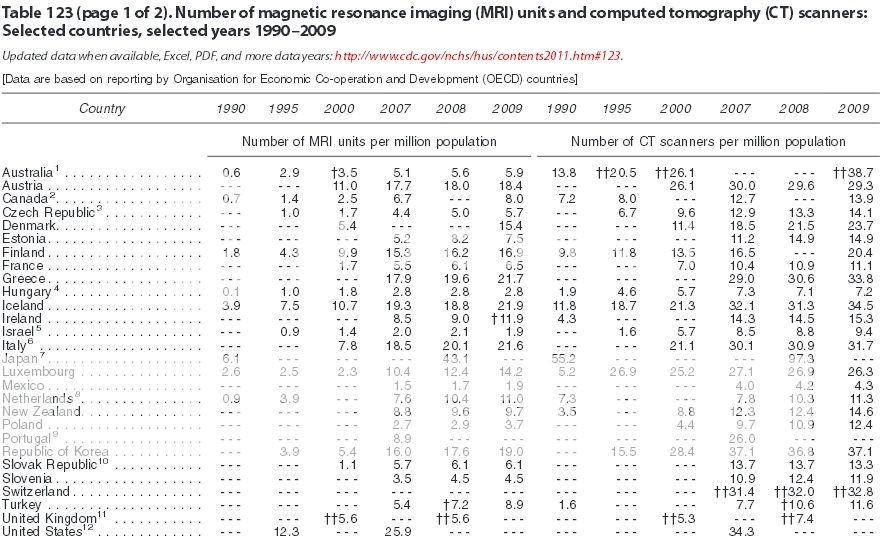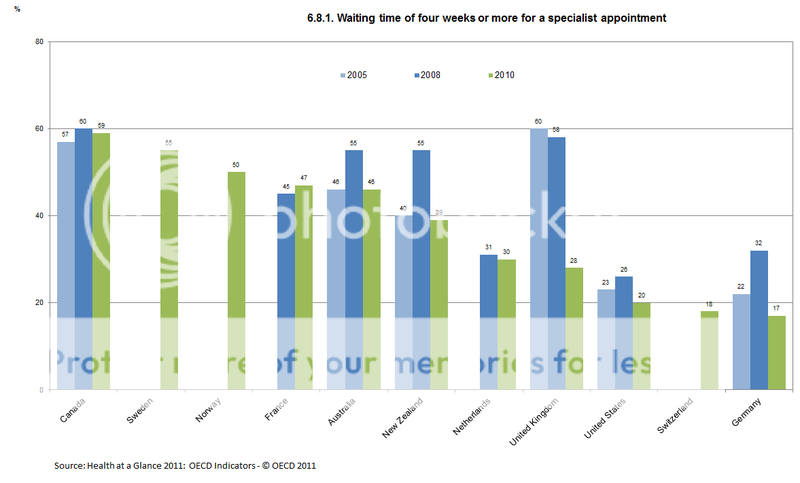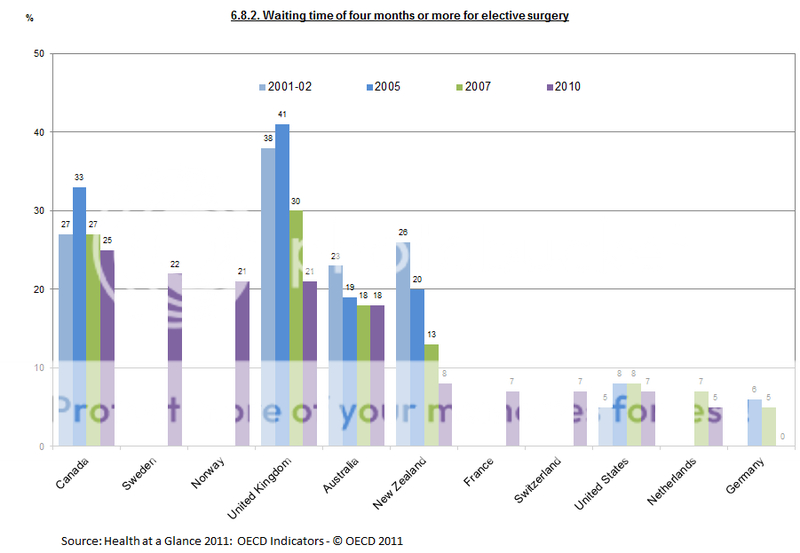Ernie S.
Diamond Member
I do. You started this thread by stating that you had had a serious illness. I will not wait 5 days to be treated for a serious illness here. Why are you so complacent?
Follow along with the video below to see how to install our site as a web app on your home screen.
Note: This feature may not be available in some browsers.
But they didn't have to wait a week because their first visit was not to a doctor in the public system.......oh wait......nevermind.Would you like to be missing a hand or dead because you had to wait a week for a referral? I was admitted to the hospital in septic shock It's very likely that I didn't HAVE a week to wait for the bureaucratic wheels to be greased.HUCH (Helsinki Regional Hospital Services) have access to my records, and I signed a form allowing that information to be available to my GP and visa versa.
My specialist signs off on my care, and that information is forwarded to the Ministry of Health. So they have access to my name, personal id number, and the extent of my treatment - but not the nature of that treatment. At least, that is how I understand it.
I agree that in the US each citizens gets what they pay for, and that is fair enough, I suppose. But for myself I like that one vendor provides excellent services to all. I like that some old lady can get a retinal transplant that allows her to live alone another 10 years, or that some kid can get a kidney transplant without it bankrupting his parents.
And right now I like that for all my years paying taxes, I can enjoy excellent care without having to even think - am I covered for this shit? Can I afford this?
Have you considered how less serious your illness might have been had you received prompt treatment?
You keep saying 3 working days like the weekend doesn't count when you're sick. Medicine works 7 days a week here.Ernie -
Not all serious illnesses require urgent treatment, because they don't actually change or worsen from one day to the next. In my case, I wasn't in any pain or discomfort at all, nor in any danger of dying or the condition suddeinly worsening. Of course, I wouldn't have wanted to have left it for months, but I had expected that treatment might have started 2-3 weeks later than it did.
As I mentioned, there were only 3 working days between consultation and treatment, and possibly that would have been a day less in some hospitals the US, but quite possibly also a day or two later, I suspect.
During the last few months I have faced a fairly serious illness, and thought it might be interesting for US posters to know how the system works here.
I initially saw a private doctor, as I had sore ribs after a football accident the previous evening and wanted to get it checked out the same day. A consultation and an X-ray set me back €120, and after that I was referred to the public sector. (Had I gone to a public sector doctor, I'd probably have waited 3-4 days and not been able to choose an appointment time)
After a delay of one week I had a few hours worth of tests, and then waited another week to meet with a specialist. After the meeting with the specialist on a Friday, I began treatment the following Wednesday.
The half-day of testing cost me €29, and the meeting with the specialist another €29. I did spend €77 on medications, but from that point on all of the treatment has been completely free, based on the specialists recommendation. So the total cost of the entire treatment program will be around €150.
To my mind, the service has been amazing. All of the people I have met have been fantastic. The facilities and equipment have been state of the art, the nurses friendly and helpful, and the service excellent.
Healthcare may not be as good in every country that has universal healthcare, but my experience has convinced me that the service we get here is likely as good as most hospitals in the US - and it is covered efficiently and easily through my taxes. It's available to everyone, it is fast and it works.
You keep saying 3 working days like the weekend doesn't count when you're sick. Medicine works 7 days a week here.Ernie -
Not all serious illnesses require urgent treatment, because they don't actually change or worsen from one day to the next. In my case, I wasn't in any pain or discomfort at all, nor in any danger of dying or the condition suddeinly worsening. Of course, I wouldn't have wanted to have left it for months, but I had expected that treatment might have started 2-3 weeks later than it did.
As I mentioned, there were only 3 working days between consultation and treatment, and possibly that would have been a day less in some hospitals the US, but quite possibly also a day or two later, I suspect.
I get it that you didn't think a 5 day delay in treatment was a big deal. I guess you're complacent in what the Finnish government doles out to you. I'd rather be in charge of my own health care, thank you.
My only bureaucratic hurdle came when I changed doctors. I simply called the insurance company and gave them some background on the surgeon and they agreed that he was far from the best candidate for my after care. I had a list of 3 hand surgeons and they picked the one closest to me, likely because they would be paying for my transportation. I was fortunate that the guy they chose was the hand surgeon to the stars. He is the guy the Miami Dolphins and Miami Heat and the Florida Marlins send injured players to.
So, I got the best possible care with no wait, a minimum of bureaucracy and zero out of pocket expense other than the Cuban coffees I bought my driver most mornings.
You still haven't said what your "serious" illness was. My situation was both serious and urgent. Private practice doctors here can make that determination without jumping through bureaucratic hoops. He made such a determination and saw me 18 hours after he was informed of my situation.You keep saying 3 working days like the weekend doesn't count when you're sick. Medicine works 7 days a week here.Ernie -
Not all serious illnesses require urgent treatment, because they don't actually change or worsen from one day to the next. In my case, I wasn't in any pain or discomfort at all, nor in any danger of dying or the condition suddeinly worsening. Of course, I wouldn't have wanted to have left it for months, but I had expected that treatment might have started 2-3 weeks later than it did.
As I mentioned, there were only 3 working days between consultation and treatment, and possibly that would have been a day less in some hospitals the US, but quite possibly also a day or two later, I suspect.
I get it that you didn't think a 5 day delay in treatment was a big deal. I guess you're complacent in what the Finnish government doles out to you. I'd rather be in charge of my own health care, thank you.
My only bureaucratic hurdle came when I changed doctors. I simply called the insurance company and gave them some background on the surgeon and they agreed that he was far from the best candidate for my after care. I had a list of 3 hand surgeons and they picked the one closest to me, likely because they would be paying for my transportation. I was fortunate that the guy they chose was the hand surgeon to the stars. He is the guy the Miami Dolphins and Miami Heat and the Florida Marlins send injured players to.
So, I got the best possible care with no wait, a minimum of bureaucracy and zero out of pocket expense other than the Cuban coffees I bought my driver most mornings.
Ernie,
You have no clue between 'Serious' and 'Urgent'.
Also does your doctor to the stars just sit around all day waiting for you to ring or does he have appointments to deal with?
The Finnish system costs almost half what the US system does and it covers all the people. It is very easy having a heath system that doesn't cover the poorest 10+%.
The US system is a piece of crap, Obamacare is better but is far from the Universal Healthcare the US should be demanding.
You are a sheep to the well off.. You're one of the useful idiots...
You still haven't said what your "serious" illness was. My situation was both serious and urgent. Private practice doctors here can make that determination without jumping through bureaucratic hoops. He made such a determination and saw me 18 hours after he was informed of my situation.You keep saying 3 working days like the weekend doesn't count when you're sick. Medicine works 7 days a week here.Ernie -
Not all serious illnesses require urgent treatment, because they don't actually change or worsen from one day to the next. In my case, I wasn't in any pain or discomfort at all, nor in any danger of dying or the condition suddeinly worsening. Of course, I wouldn't have wanted to have left it for months, but I had expected that treatment might have started 2-3 weeks later than it did.
As I mentioned, there were only 3 working days between consultation and treatment, and possibly that would have been a day less in some hospitals the US, but quite possibly also a day or two later, I suspect.
I get it that you didn't think a 5 day delay in treatment was a big deal. I guess you're complacent in what the Finnish government doles out to you. I'd rather be in charge of my own health care, thank you.
My only bureaucratic hurdle came when I changed doctors. I simply called the insurance company and gave them some background on the surgeon and they agreed that he was far from the best candidate for my after care. I had a list of 3 hand surgeons and they picked the one closest to me, likely because they would be paying for my transportation. I was fortunate that the guy they chose was the hand surgeon to the stars. He is the guy the Miami Dolphins and Miami Heat and the Florida Marlins send injured players to.
So, I got the best possible care with no wait, a minimum of bureaucracy and zero out of pocket expense other than the Cuban coffees I bought my driver most mornings.
Ernie,
You have no clue between 'Serious' and 'Urgent'.
Also does your doctor to the stars just sit around all day waiting for you to ring or does he have appointments to deal with?
The Finnish system costs almost half what the US system does and it covers all the people. It is very easy having a heath system that doesn't cover the poorest 10+%.
The US system is a piece of crap, Obamacare is better but is far from the Universal Healthcare the US should be demanding.
You are a sheep to the well off.. You're one of the useful idiots...
The US system may cost more, but the care is superior, more timely and the patient, not the public is responsible for the bill.
In your system, yes, I would have been treated, but it is very likely I would have lost my hand. Therapy and a prosthesis would have made the bills similar or very possibly higher in the case of Finnish care solely because of the bureaucratic hurdles.
So The bill was, let's say, $100,000 under both systems. In mine, I have a left hand. In yours, I have a plastic thing that looks kind of like a hand.
Granted, under your system, it didn't cost me anything..... or did it? The problem is, it cost some poor bastard in Boise Idaho as much as it did me. Sorry but I feel I should be responsible for the debts I incur.
AND.... Our system does cover the poorest 10%. No one is turned away from emergency rooms here. Everyone is free to get the education and knowledge to obtain a job that offers insurance. Everyone has the right to earn money, but taking mine, against my will to pay for the unfortunate choices of others is just plain theft.
Actually Americans do want quick, accessible, affordable, and quality health care. If free market forces can't do that for all Americans, then we must continue exploring government options.
You might pay for a specialist here but you could have gone to the hospital and had your tests and xrays and not wasted that $120 you did.

.
However, what is done in countries where costs are contained, is a "triage" system. If you are in need of immediate care, you get it. But if your situation isn't urgent, you have to wait a bit.


In Canada, we have good and (relatively) cheap, but it's not as quick as the US, because our health care is used to capacity.
You might pay for a specialist here but you could have gone to the hospital and had your tests and xrays and not wasted that $120 you did.
Having tests presumes the presence of the equipment needed to conduct the tests.
